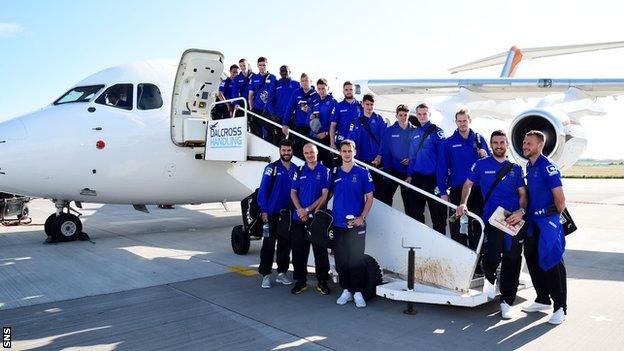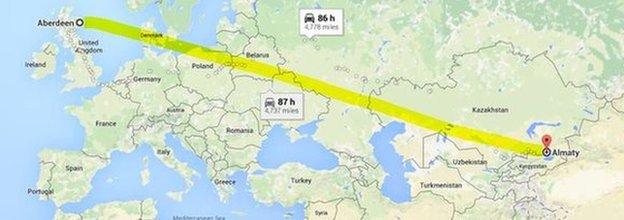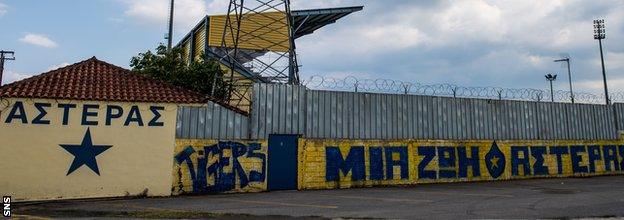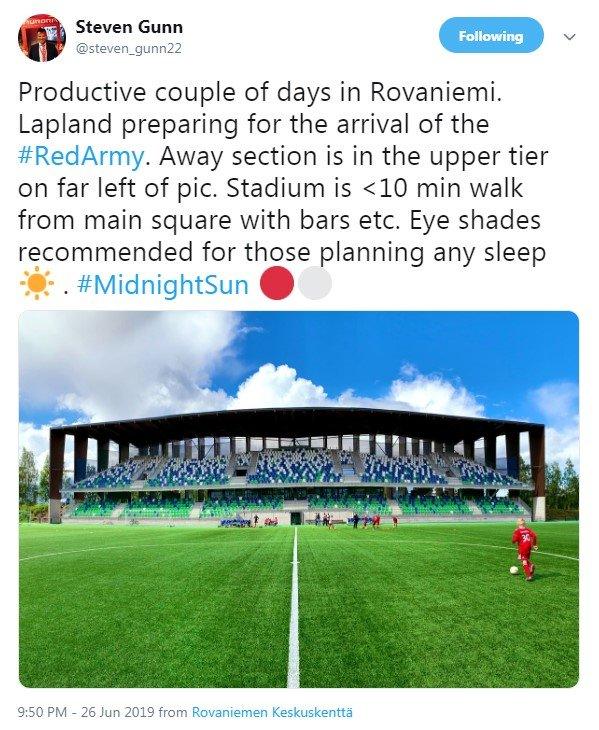How do Scottish clubs prepare for European trips?
- Published

Inverness Caledonian Thistle travelled to Romania in 2015 - their only season in continental competition
Frantic internet searches, bird strikes, cancelled planes and squabbles over the temperature... arranging away matches in Europe is rarely straightforward, particularly in the qualifying rounds.
But what goes into plotting trips to play in the Champions and Europa League in far-flung or remote parts of the continent?
Laura Montgomery, who oversaw Hibernian's trips to the Faroes Islands, Greece and Norway last season and has arranged Glasgow City's jaunts for more than a decade, and Aberdeen director of football operations Steven Gunn, who has spent the past couple of weeks frantically plotting the Pittodrie club's adventure to Lapland to face Finnish side RoPS, explain all...
Make your plans early
Although most clubs often get no more than a couple of weeks' notice between the draw of each European round and the actual matches, most Scottish sides begin preparations as early as possible.
Having qualified for continental competition in each of the past six seasons, Aberdeen have a well-established routine of speaking to their preferred travel company towards the end of the previous campaign to start making provisional plans.
"They're very familiar with exactly what our expectations and requirements are," explains Gunn. "So as soon as there's a possibility that we might qualify, we open dialogue with them."
Montgomery, a veteran of arranging expeditions to the likes of Kazakhstan in her role as club manager of Glasgow City and also a Uefa delegate, says the serial Scottish champions now know the drill "like the back of our hand".
However, the difference in her day job with Hibs is the resources she has at her disposal. The frantic internet searches for flights and hotels that follow Women's Champions League draws is replaced by travel company negotiations and site reconnaissance.
"We're in a fortunate position of being able to go out and look at different hotels," said the Easter Road club's head of sales and sponsorship. "So when the prospect of where we could go comes up, our head of football and the travel company representative would fly out to look at appropriate places."
Identify the priorities

The 3,415 miles between Aberdeen and Almaty was the longest distance travelled in a European club competition when the Pittodrie side did it in 2015
So what are the main things clubs have to consider when it comes to actually booking these trips to weird and wonderful locations in places that most would struggle to find on a map?
The first priority is how to physically get there. Both Hibs and Aberdeen tend to charter aircraft, rather than trying to book on to scheduled flights, but even that does not eliminate all the quandaries.
"When do we want to leave? Do we need a fuel stop or an overnight journey? If we're going far east and there's a time difference, do we stay on UK time? These are all things we need to consider," says Gunn.
"Sometimes you're travelling outside Europe - we were in Kazakhstan a few years ago, which was the longest journey in European football history at that point. We were something like 200 miles from the Chinese border."
Once actually getting to the country in question is sorted, location becomes the primary concern. Both Gunn and Montgomery talk about the triangle between the airport, hotel, and stadium and the importance of limiting travel time between the three.
"It needs to be a balance of not being too far from the venue because you don't want the players in a coach for a long period, but also somewhere quite quiet so that the players can sleep," Montgomery says.
But as well as getting enough rest, the issue of feeding the squad also needs to be addressed, particularly on some of the more exotic trips around Europe.
"On occasion, we've taken our own chef," Gunn says. "There might be things that a hotel can't provide that we would want so we bring that food over and prepare it ourselves."
Be prepared for problems

Hibs played in Greece last season, but only after a late drama with their flight
A football match can change in an instant but so, too, can matters off the pitch. And those cannot just be amended with a substitution or change in tactics.
"In 2014, we were going to Latvia to play Daugava Riga," Gunn recalls. "The plane was struck by a bird when it was arriving in to Aberdeen and although it landed safely, it wasn't able to take off."
To pass the time, Derek McInnes' squad returned to Pittodrie, trained, had lunch and returned to the airport to find a replacement plane waiting for them. Problem solved.
For Montgomery and Hibs, though, their own plane drama before their meeting with Asteras Tripolis in Greece was more complicated.
"We found out the day before that we wouldn't be able to fly because the pilot was unwell," she says. "We then had to find another chartered flight but the only available plane was much smaller. So people we had going on the initial plane weren't able to go on the second one. And then we had to find another route to get them out.
"Last year we thought everything was conspiring against us at some point because every single thing we did led to something disastrous happening. But the main thing is that you don't let that feed back to the players and the manager because you want them focussed on the football."
Adapt to the environment
Yet even if the flight and accommodations plans all work out perfectly, problems can still arise at the stadium, as Gunn found out when Aberdeen faced Rijeka in 2015.
The temperature in Croatia that day was a degree below the threshold for an automatic water break, leading to "a bit of a debate" in the Uefa meeting on the morning of the game and further tense "negotiations" pre-match.
"I used my phone to get the temperature pitch side and went in to see the referee," Gunn says. "We compromised on one water break in the first half and, after that, we went on to win 3-0. That was one occasion that I'd like to think that I've had a bit of an influence."
Sometimes, though, the challenges can be more sobering. In 2008, Glasgow City travelled to Serbia for a Champions League match in Nis, just nine years after war ravaged the country.
"The people were really fantastic but the infrastructure in that area of the city was really poor," recalls Montgomery. "They were still struggling after the war and it was quite an uncomfortable environment.
"We were in the best hotel in the area but it would have been be the worst hotel in the UK. That made it challenging but you just have to deal with all these things."
